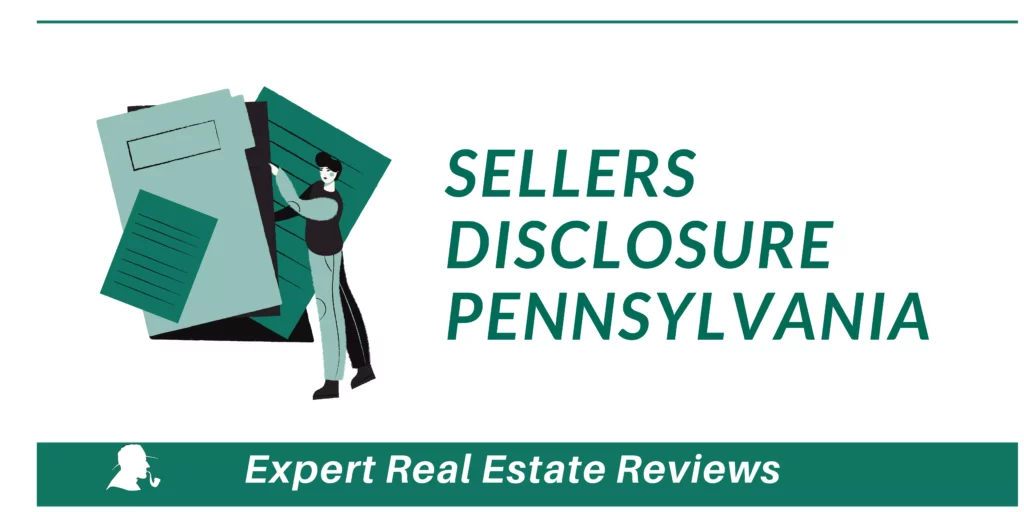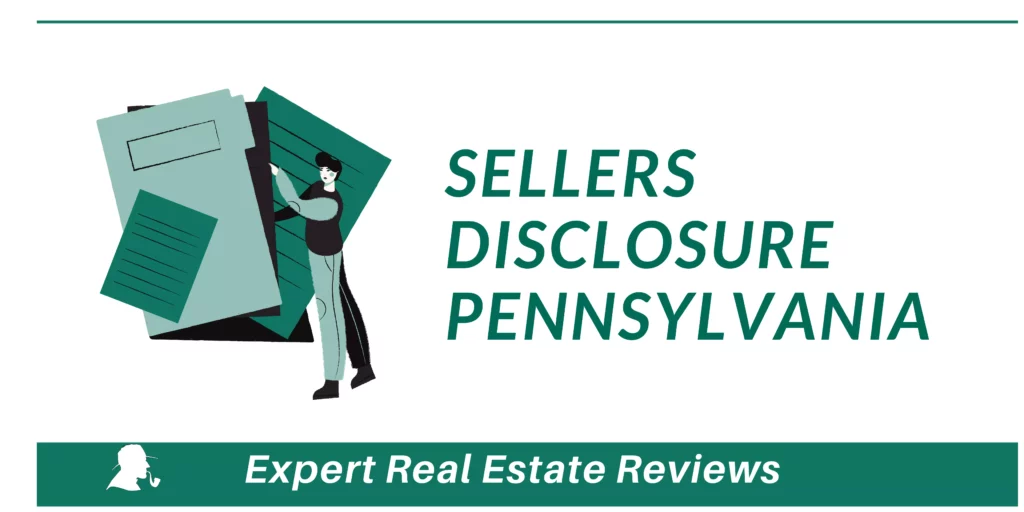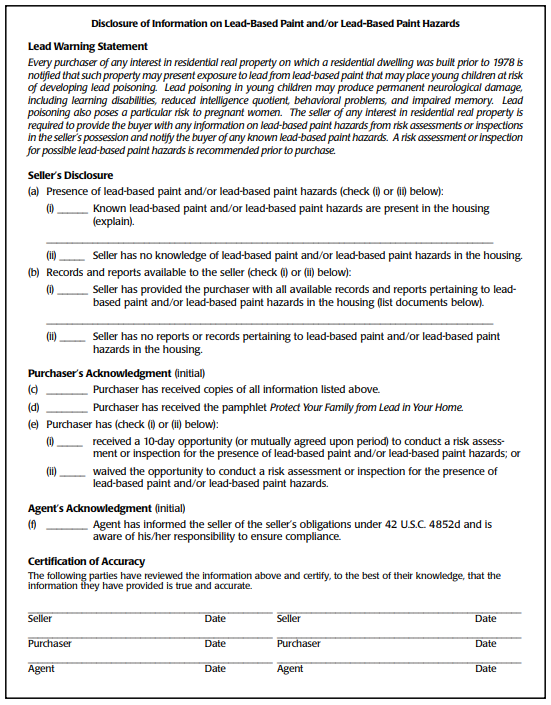Sellers Disclosure Pennsylvania


Sellers from different counties and states have different real estate obligations provided by laws. The most common and relatively most important thing is to list everything they know about the condition of the property. Sellers disclosure PA is a standard form that all sellers need to complete before selling their homes in Pennsylvania.
Here are the two disclosure requirements you need to know if you are selling a property in Pennsylvania:
- Federal Disclosure of Information on Lead-Based Paint and/or Lead-Based Paint Hazards
- Seller’s Property Disclosure Statement
Residential Lead-Based Paint Hazard Reduction Act

The Residential Lead-Based Paint Hazard Reduction Act passed in 1992 requires the disclosure of any lead-based paint or chipped paint in any housing built before 1978.
Sellers must complete the lead-based paint disclosure under the federal law. The seller discloses any known information about the presence of lead-based paint or chipped paint on the property, to the best of his knowledge.

The seller may provide a 10-day period for the buyer to conduct a paint inspection or risk assessment for lead-based paint or related hazards. He can hire qualified experts to inspect the property entirely.
Although not all of them may have the resources to do so, it is still practical for the seller to disclose everything he knows about the property to avoid any legal real estate conflicts in the future.
Seller’s Property Disclosure Statement
The Pennsylvania Association of Realtors came up with a standard Seller’s Property Disclosure Statement. It discloses the condition of the property and all its material defects in accordance with Pennsylvania’s Real Estate Seller Disclosure Law.
Material defects are significant factors that impact the value of your property. A loud neighborhood or a dark history involving horrific crimes is considered as immaterial facts. Hence, its disclosure is not required. However, if the roof leaks when it rains or if the air conditioning system needs repair. All of these facts must be clearly stated.
What particular information should you disclose?
Seller’s Expertise
Disclose your expertise in contracting, engineering, architecture, or other areas related to conditions of the property and its improvements.
A seller is expected to be more knowledgeable about the house and have better observations if they are an engineer.
House’s Structure, Systems, and Equipment
Disclose the condition of the roof, attic, basement, walls, and foundation of the house. You also state if there are existing or past issues of termites and/or other pests. A seller must inform the buyer if the house was altered in the past, along with the permits taken.
Sellers disclose the state of the water supply and various systems such as plumbing, sewage, electrical, heating, air conditioning, etc. You also mention the state of other equipment or appliances included in the sale.
They should also be aware of the land and flooding status as well as other environmental issues. If there are any hazardous substances such as radon or asbestos, you must also definitely disclose them.
Moreover, the seller discloses condominiums and other homeowners association fees.
The Real Estate Seller Disclosure Law does not require the seller to initiate any property inspection. But, it is your responsibility to disclose all known material defects at the completion of the disclosure form.
Failure in submitting seller disclosures makes a seller vulnerable to lawsuits against defects that the buyer may detect subsequently.
Note: All the information mentioned above is just a guide for real estate sellers in Pennsylvania It is still best to seek legal advice from experts if you have any clarifications.
Sellers from different counties and states have different real estate obligations provided by laws. The most common and relatively most important thing is to list everything they know about the condition of the property.
Here are the two disclosure requirements you need to know if you are selling a property in Pennsylvania:
- Federal Disclosure of Information on Lead-Based Paint and/or Lead-Based Paint Hazards
- Seller’s Property Disclosure Statement
Residential Lead-Based Paint Hazard Reduction Act

The Residential Lead-Based Paint Hazard Reduction Act passed in 1992 requires the disclosure of any lead-based paint or chipped paint in any housing built before 1978.
A seller submits lead-based paint disclosure under the US Federal law. The seller needs to disclose any information he has about the presence of lead-based paint or chipped paint to the best of his knowledge.
The seller provides a 10-day period for the buyer to conduct a paint inspection or risk assessment for lead-based paint or related hazards. He can hire qualified experts to inspect the property. It is important for the seller to disclose all known defects to avoid any legal real estate conflicts in the future.
Seller’s Property Disclosure Statement
The Pennsylvania Association of Realtors had come up with Seller’s Property Disclosure Statement. It discloses the condition of the property and all its material defects in accordance with Pennsylvania’s Real Estate Seller Disclosure Law.
Material defects are significant factors that have an impact on the value of your property. Being situated in a loud neighborhood or having a dark history involving horrific crimes is considered immaterial. Hence, it need not be disclosed. However, if the roof leaks when it rains or the air conditioning system needs repair, then it must be disclosed.
What particular information should you disclose in sellers disclosure PA?
Seller’s Expertise
Your expertise in contracting, engineering, architecture or other areas related to construction and conditions of the property and its improvements is relevant to know the veracity of your statements about the physical condition of the house you are selling.
For example, if you are an engineer, you are expected to be more knowledgeable in your house and have better observations when compared to sellers who are in medical fields.
House’s Structure, Systems, and Equipment
You should disclose the condition of the roof, attic, basement, walls, and foundation of the house. You should also state if there are existing or past issues of termites and/or other pests. Additionally, buyers should know if the house has been altered and if there are any permits obtained for the alteration.
Buyers should also know the state of the water supply and various systems such as plumbing, sewage, electrical, heating, and air conditioning, and also the state of other equipment or appliances included in the sale. They should also be aware of the land and flooding status as well as other environmental issues. If there are any hazardous substances such as radon or asbestos, you must also definitely disclose them.
Moreover, condominium and other homeowners association fees should also be disclosed in addition to other legal fees like deed restrictions or defects in title.
Final Word
The Real Estate Seller Disclosure Law does not require the seller to initiate any property inspection. But, it is your responsibility to disclose all known material defects at the completion of the disclosure form.
Failing to do so will not protect you from any monetary problems you might encounter in the future for repairing latent defects or from actual damages that your buyers have detected subsequently.
» More: How To List On MLS FSBO Without A Realtor
Note: All the information mentioned above is just a guide for real estate sellers in Pennsylvania It is still best to seek legal advice from experts if you have any clarifications.
Related: pa seller disclosure form, sellers disclosure pa, pa real estate disclosure law, pennsylvania real estate seller disclosure law.
pa real estate seller disclosure form, real estate seller disclosure law, selling a house as is in pa. seller’s property disclosure statement pa, pa real estate law, pa seller’s disclosure law, pa seller disclosure law. seller’s disclosure form pennsylvania pa seller’s disclosure statement, free seller disclosure form pa, closing an estate in pa. pa disclosure statement, house for sale by owner pa,
for sale by owner pa, agreement of sale pa, house pa, buying a home in pennsylvania. disclosure law, what is a seller’s disclosure statement real estate disclosure statement, what is a seller’s disclosure, closing costs, disclosure documents, law firm, file a petition, small estates, tax returns, family settlement agreement, selling your home, bank accounts, disclosure requires, personal representative, sales price, full disclosure, sale by owner websites, sites for sale by owner, cash for homes near me, how to get your home on the mls, best real estate sites
